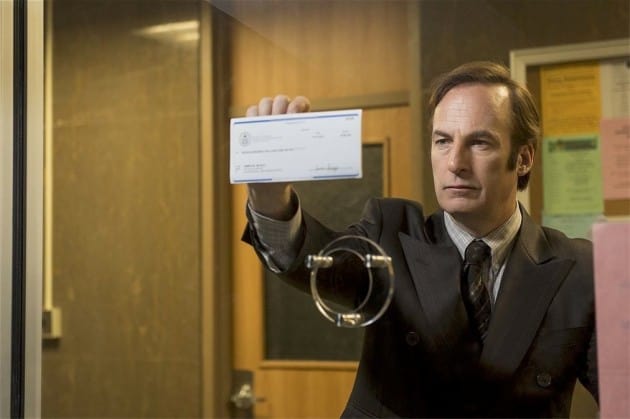
There has been a lot of hype for Better Call Saul. People have been waiting for it with real anxiety since Breaking Bad wrapped up its supernova of a last season. The hype wasn’t all positive, though; many critics believed it to be a cash-grab, or worse, a charity project. Truth be told, I didn’t know what to make of the idea of a Breaking Bad spin-off, at first; I wanted more of BB, sure, but did I really? Was I one of those fans content to stay in a world that was long past its expiration date.
The answer is, of course, yes.
But I didn’t get that. I didn’t get the Breaking Bad fix that I so hoped for. Instead, I got something better; a true spin-off, close enough to its parent that it felt familiar but far enough away that it didn’t feel strangled by it. Saul Goodman, as a character, was always an outlier. He never quite fit in with the oncoming, enveloping darkness of the rest of the show. He was there for comedic relief, and like his predecessor Jesse, he became something much more.
I want to also commend the creators of the show, Vince Gilligan and Peter Gould, for their craft work. This is an expertly structured episode; even when the show is clearly in expository mode, its foundations are solid as rock, and it allows the show to, at worse, muck around in B+ territory. That’s the beauty of things like the Three-Act Structure and the Hero’s Journey and the Four-Act; they act as the floor of the show, and nothing is more important than the floor in television. A high floor allows for more time, more money, and more power. If your worst is someone else’s good, then you are in a really nice place.
The directing was also as perfect as can be, and this is where being attached to Breaking Bad is a good thing. This episode was written by Gilligan and Gould, and directed by Gilligan; just knowing who made it and where it came from adds a layer that otherwise would take seasons to develop. Little things stand out, and big things take on new meaning. The opening being shot in black and white; the extended focus on the slit in the blinds; the montage at the Cinnabon with a disguised Saul Goodman; all of it is tense beyond the show’s years.
I told a friend tonight that I feel like the show, just from this one episode, has hit its stride, and I believe that. I think it’s already on par with the season three episodes of its parent show. I’ve seen some critics say that they show gets better after the first two episodes, because then it finally breaks free of the shadow of Breaking Bad. Let me put it this way: I don’t think that it’s in BB‘s shadow now. These first few episodes were always going to be callbacks and little winks and nods; really, in a way, the whole how is a wink and a nod. But that doesn’t mean it’s not its own thing. It is very much distinct. Perhaps that’ll change; I fully expect the show to get darker. But it’s not telling the same story, not even close. And that’s good enough for me.
Stray Thoughts:
– God, I wish I could watch the rest of the episodes right now.
– Odenkirk does some really subtle, really powerful acting, especially in the opening.
– I am utterly fascinated by the woman he shared a cigarette with. I want to know more about her.
– TUCO IS BACK, BABY. LONG LIVE THE SORTA-KINDA-MOSTLY-MINOR DRUG RUNNER GUY.
[Photo via AMC]
 Follow Us
Follow Us





